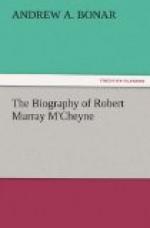One evening, after our visit to Sychar, he referred to the Bible which I had dropped into Jacob’s Well. We were then resting from our journey in our tents. Soon after he penned on a leaf of his note-book the following fragment:—
My own loved Bible,
must I part from thee,
Companion of my
toils by land and sea;
Man of my counsels,
soother of distress,
Guide of my steps
through this world’s wilderness
In darkest nights,
a lantern to my feet;
In gladsome days,
as dropping honey sweet.
When first I parted
from my quiet home,
At thy command,
for Israel’s good to roam.
Thy gentle voice
said, “For Jerusalem pray,
So shall Jehovah
prosper all thy way.”
When through the
lonely wilderness we strayed,
Sighing in vain
for palm-trees’ cooling shade,
Thy words of comfort
hushed each rising fear,
“The shadow
of thy mighty Rock is near.”
And when we pitched
our tents on Judah’s hills,
Or thoughtful
mused beside Siloa’s rills;
Whene’er
we climbed Mount Olivet, to gaze
Upon the sea,
where stood in ancient days
The heaven-struck
Sodom—
Sweet record of
the past, to faith’s glad eyes,
Sweet promiser
of glories yet to rise![14]
[14] It is a somewhat curious occurrence, that the remnants of this Bible were found and drawn up from the bottom of the well, in July 1843, by Dr. Wilson and his fellow-traveller, who employed a Samaritan from Sychar to descend and examine the well.
At the foot of Carmel, during the seven days we were in quarantine under the brow of the hill, we had time to recall many former scenes; and in these circumstances he wrote the hymn, The Fountain of Siloam.
Here, too, he had leisure to write home; and most graphically does he describe our journey from Alexandria onward.
CARMEL, June 26, 1839
“MY DEAR FATHER, MOTHER, etc.—It is a long time since I have been able to write to you,—this being the first time since leaving Egypt that any one has appeared to carry letters for us. I must therefore begin by telling you that, by the good hand of our God upon me, I am in excellent health, and have been ever since I wrote you last. Fatigues we have had many, and much greater than I anticipated; hardships and dangers we have also encountered, but God has brought us all safely through, and in fully better condition than when we began. You must not imagine that I have altogether lost the palpitation of my heart, for it often visits me to humble and prove me; still I believe it is a good deal better than it was, and its visits are not nearly so frequent.




